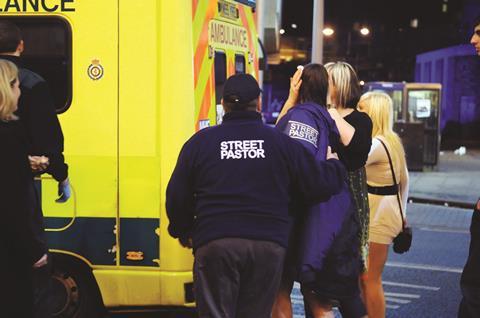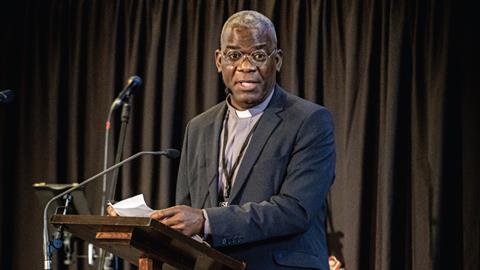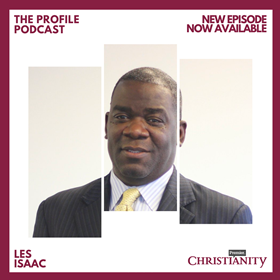As Street Pastors celebrates its 20th anniversary, founder Rev Les Isaac OBE says it’s time for the Church to get up out of the pews and work together
Les Isaac may be a reverend, but sometimes he finds church services a bit boring.
That isn’t because he’s a rebellious backslider – far from it – he just has first-hand experience of the miracles God can do when Christians get out of their buildings and take the message of Jesus to the streets.
The result of this radical obedience to Jesus’ Great Commission to “go” have been phenomenal. Street Pastors is, undoubtedly, one of the UK Church’s most successful outreach projects. Every weekend, teams of Christian volunteers across 240 towns and cities brave the elements, donning their hi-vis jackets to be a peaceful presence among the night-time economy – offering a listening ear and practical help to those who may be vulnerable, homeless or under the influence of drugs and alcohol.
As the name implies, Street Pastors are unashamedly Christian, and stories proliferate of lives changed by God (such tales literally filled a book, Stories From the Streets; Instant Apostle). One of the lessons seems to be that when Christians, often of different denominations, come together in unity for mission, God blesses it.
You grew up in Antigua, and have said that moving to the UK was like “going from the oven to the freezer”. You also encountered racist attitudes here, and struggled with depictions of a white Jesus. What happened next?
By the time I was eleven, I was very disillusioned and I shifted toward Rastafarianism, because it talked about being Black, about Africa and emancipation. There was something there which resonated in me.
Later, I went totally away from God. But God has a beautiful way of speaking to people. I tell people – it doesn’t matter where your child, your husband or your wife is, pray for them. Because God has a beautiful way, through his Spirit and through his word, of getting to them.
Could you believe it – I was in a nightclub in the West End [of London] and at 3:30am I heard a voice speaking to me: “You do not belong here.” I thought maybe I’d smoked one too many, you know? But God was speaking to me! On another occasion, while smoking in Primrose Hill on a Sunday afternoon, I met a Christian guy with his Bible in his hand. He spoke to me about Jesus in a very powerful way. I began a journey, and God began to reveal himself.

Looking back, perhaps God was preparing you for Street Pastors – showing you that he is present in the clubs and on the streets?
Very much so. One of the things I said to myself when I was just converted, was: I need to go back to those places. I need to go talk to people about Jesus.
I want to help people understand that the Jesus of the Bible came into this world out of real, unconditional love. I felt I had to become an agent for the gospel of Jesus, so that people could understand that this is not dead. It’s personal, it’s powerful and it’s dynamic.
It strikes me that evangelism works best when you’re doing it because you want to share the love of God, and not out of duty or obligation.
Exactly. I’ve always thought, all the way through my ministry, that I want to be excited about Jesus. In fact, when I became a minister, I said to my superintendent: “Listen, I get bored if I’m in [church] four Sundays a month. I need to be out there!” Because part of the Church’s role and responsibility is to be salt and light in this world. We’ve got to take this gospel outside of our four walls, and share Jesus.
How did Street Pastors begin?
A journalist rang me and said: “Reverend, what’s the problem with young people in today’s society? Is it poverty? Is it lack of education?” That journalist caught me off guard. After that phone call, I began a two-year journey, searching [for answers]. I met with the police, the mayor, community leaders, school teachers and young people. I went to see the local borough commander in Lambeth. And I said to him: “What’s the most challenging time for you and your officers within a 24-hour cycle?” One of them was between 10pm and midnight, when people leave the pubs and go to the clubs. The other was 2:30am to 4am, when people leave the nightclubs and go to the kebab shop or bus stop. That’s where all the tensions are.
I didn’t want Street Pastors to be a Pentecostal thing. It needed to be the whole church
I met with Rev David Shosanya and Ian Crichlow, a police officer, in my front room. I said: “The streets are the problem. We need a pastor.” We took the word “shepherd-carer”, David came up with a five-point plan and Ian talked about safety and training. By the time we’d left the room, we had Street Pastors wrapped up. It was incredible. I’ve never forgotten that evening.
Then we said: “How are we going to finance this?” I had a conversation with Rev Wale Hudson-Roberts and, together, we met with Ian Coffey, the then-general secretary of the Baptist Union. Ian said: “This is fantastic. I can see this working. I cannot just talk and pray with you without doing something.” The Baptists gave us £7,500 to run training, buy uniforms and make this thing happen. So God bless the Baptists for that!
So right from the beginning, it was Christians of different denominations working together?
Yes, I didn’t want it to be a charismatic / Pentecostal thing. It needed to be the whole Church. And one of my greatest joys is to see so many different Christians come together, pray, work together and not have any ding dongs about theology!
What does an average evening look like for a Street Pastors team?
First the team meets up to be briefed – they may get a report from the police saying: “We’ve been having problems here, at this time; it would be really good if the Street Pastors could be there.” We pray, and we have another team of prayer pastors who pray for us – sometimes at the base, or in a home or in another church.
When we go on the street, we’re in pairs. We’re looking out to see what’s happening. It could be a young lady whose drink has been spiked. Or someone who’s sick or lost or contemplating suicide. There are protocols to deal with people who might be drunk, and we work with the nightclubs. Invariably, people stop us and ask us to pray for them. If there’s a potential fight between two groups, we split up in twos and try and talk to them and give them lollipops – and the fight suddenly goes away! Our secret weapon is our nans and grandads. They are absolutely superb.
![Revd Les Isaac seated]](https://d17xjl6rg4e8ic.cloudfront.net/Pictures/480xany/6/3/4/30634_revdlesisaacseated_34655_crop.jpg)
What have been the biggest hurdles you’ve faced over the past 20 years of the ministry?
Sometimes it has been difficult for the Church to understand that evangelism doesn’t just come in one way – it doesn’t always have to be about getting the microphone and doing a proclamation. Evangelism takes friendship, credibility and time. Jesus spent time breaking bread with people, being among people; the publicans and sinners.
At times, it has been difficult to convince some of our churches that we can do this. What is really frustrating is that we have a lot of openings, but we haven’t got churches plugged in. I was at a nightclub, and they invited me to see the improvements they’d made in looking after people. And I was thinking: Wouldn’t it be great to invite a local church pastor to meet the managers of this club, and they could take this club on and pray for it. But I can’t find them! Christians are tucked up in bed at nine o’clock – they’ve gone. They’re in the third heavens by twelve! But that nocturnal society is moving. We’ve got to realise that evangelism is different in the 21st century. And unless we’re relevant in it, we won’t touch people.
Are you optimistic about the future of the Church in the UK?
I am always optimistic about the Church because, at the end of the day, it’s about God. Let’s be honest, the Church is doing some great things. But we’re not always good at PR.
I strongly believe we have to pray more together, not in our silos. I long for the day when the Church is saying, across towns and cities: “We’re coming together to pray, fast, wait upon God, cry out together and intercede.” I think the Church has got to rediscover that Acts 2 spirit.
Secondly, I think the Church has got to recognise that this is not about one denomination. None of us own the monopoly on the truth. God has called us to love each other and to be one. If we’re going to see a change in our nation, it’s going to be with us together, as the Church, not as one segment. I think that when we do that, God will show up in a bigger way than we could ever imagine.
To hear the full interview listen to Premier Christian Radio at 8pm on Saturday 8 April or download ‘The Profile’ podcast premierchristianity.com/theprofile








































No comments yet